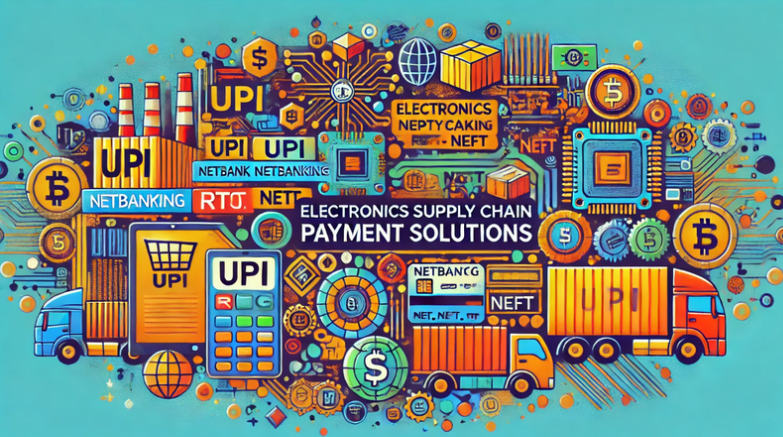AUTHOR: ELIZA FERNZ
Introduction
In recent years, the role of payment providers in the electronics supply chain sector in India has evolved significantly. These providers are no longer just facilitating transactions; instead, they are becoming integral players in optimizing the supply chain process, reducing operational friction, and enhancing overall business efficiency. Furthermore, as the electronics industry grows, so too does the complexity of managing vast, interconnected supply chains that span borders and involve numerous stakeholders. Payment providers play a pivotal role in addressing these challenges and driving growth.

The Changing Landscape of Electronics Supply Chains in India
India’s electronics industry is undergoing a transformation. Fueled by factors such as a growing middle class, the ongoing digital revolution, and government initiatives like the Make in India program, the sector is expanding rapidly.In this environment, managing payments effectively becomes more critical than ever. Therefore, it is essential for businesses to prioritize efficient payment systems to ensure smooth operations.
How Payment Providers Are Enhancing Efficiency
Payment providers specializing in electronics supply chain solutions(1) in India offer a range of services that go beyond simple transaction facilitation. They optimize payment processes, reduce friction, and ensure smoother operations.
1. Streamlining Cross-Border Transactions
In today’s global economy, many electronics businesses India(2) engage in cross-border trade. Payment providers offer solutions(3) that enable seamless transactions across different currencies and financial systems. Technologies like UPI (Unified Payments Interface) and digital wallets make it easier for businesses to complete cross-border transactions instantly, without worrying about delays or complicated currency conversions.

2. Facilitating Instant Payments
UPI, in particular, has been a game-changer in the Indian market. By enabling instant fund transfers, even between different financial institutions, UPI has simplified the payment process for businesses of all sizes.
3. Offering Supply Chain Financing
Another key offering from payment providers is supply chain financing solutions, such as factoring and invoice discounting. These solutions allow businesses to access working capital based on outstanding invoices, helping them maintain liquidity and manage cash flow more effectively.
Addressing Security and Fraud Risks
One of the most important aspects of payment processing in the electronics supply chain is security. Payment providers have developed advanced fraud detection systems that safeguard transactions and ensure that businesses can operate without the constant fear of fraudulent activity. By leveraging technologies such as artificial intelligence and machine learning, these systems can detect and prevent fraudulent activities in real-time.

The Future of Payment Solutions in the Electronics Supply Chain
As the electronics industry in India continues to grow, the demand for more efficient and secure payment solutions will only increase. Payment providers are well-positioned to play a key role in shaping the future of the supply chain, with innovations in blockchain, AI, and real-time payment systems(4) on the horizon.Moreover, with the government’s continued support for digitization and initiatives aimed at boosting local manufacturing, consequently, the need for seamless payment systems will become even more pressing.
Conclusion
Payment providers are no longer just facilitators of transactions; they are vital partners in optimizing the electronics supply chain in India.By offering innovative solutions such as instant payments(5), supply chain financing, and enhanced security, they are helping businesses overcome operational challenges, improve efficiency, and unlock new growth opportunities. As a result, the industry is experiencing significant transformation.
FAQs
1. What is a payment provider in the context of electronics supply chain solutions?
A payment provider within electronics supply chain solutions acts as an intermediary, thereby facilitating secure financial transactions between suppliers, manufacturers, distributors, and customers within the industry. Additionally, they offer specialized services that not only ensure smooth payment processing for bulk purchases, but also streamline international transfers and enable quick settlement, effectively addressing the complex nature of the supply chain.
2. How do payment providers enhance the efficiency of the electronics supply chain in India?
Payment providers streamline cash flow by enabling secure, fast, and automated transactions. They reduce delays, mitigate the risk of fraud, and ensure accurate reconciliation, improving operational efficiency. By offering local and international payment methods, they allow suppliers and manufacturers to focus on core activities, knowing that payments are managed seamlessly.
3. What types of payments do electronics businesses in India typically make through these providers?
Businesses in the electronics sector make various types of payments through payment providers, including:
- Supplier payments for raw materials and components.
- Vendor payments for manufacturing services or outsourced production.
- Cross-border transactions for importing/exporting electronics.
- Employee salaries and operational costs.
- Customer payments for B2B sales, ensuring smooth financial transactions.
4. Are these payment providers compliant with Indian financial regulations?
Yes, payment providers operating in India are required to comply with regulations set by the Reserve Bank of India (RBI) and other financial authorities. This includes adhering to anti-money laundering (AML) laws, Know Your Customer (KYC) guidelines, and providing secure transaction platforms. Compliance ensures that businesses in the electronics supply chain maintain trust and security in their operations.
5. What role do digital payment methods play in the electronics supply chain in India?
Digital payments are crucial for improving payment efficiency and transparency in the electronics supply chain. They enable quick and reliable transactions, particularly for e-commerce businesses, international suppliers, and small manufacturers. Methods like UPI, NEFT, RTGS, digital wallets, and international payment gateways are commonly used to facilitate payments instantly and reduce dependency on cash.

